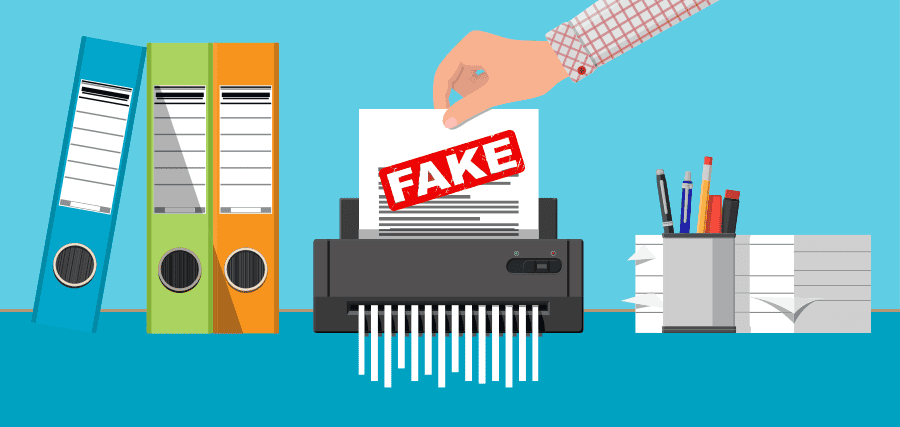Disclosure:
This content, except as otherwise indicated or stated on this site, is the property of TransUnion Rental Screening Solutions, Inc. This content is for educational purposes and for convenience only. Trademarks used are the property of their respective owners, and no endorsement or affiliation is implied. The information presented in this content is “as is” without warranties of any kind, and specifically is not represented to be complete and does not constitute legal advice, and is subject to change without notice. You are encouraged to check these terms from time to time for changes, and by accessing this site you agree to these terms and all terms listed. Laws and regulations may vary by state and locality. Consult your own counsel if you have legal questions related to your rental property practices and processes.
Your applicant looks like Little Red Riding Hood on paper, but how do you know for sure they’re not really the Big, Bad Wolf? It might not be fun or fair, but the truth is that rental scammers are out there, waiting to take advantage of unsuspecting landlords. If you don’t know how to recognize a wolf in sheep’s clothing, then you might just become lunch.
Finding responsible tenants who pay their rent on time every month is a top priority for landlords, so much so that landlords have named the loss of rental income as a primary concern. Unfortunately, rental scams could lead to some serious and expensive problems.
Beyond the loss of rental income and the costly hassle of eviction, rental scams can lead to a whole slew of expenses, including property damage. If a tenant damages your property beyond normal wear and tear, then you may end up paying hundreds or even thousands of dollars in repairs. Plus, during the time it takes to fix the damage, your property may sit vacant, costing you even more in lost rent.
There are several red flags landlords should watch out for when finding and accepting new tenants. Consider the five rental scams below, but one surefire way to search for renter warning signs is to screen with SmartMove®. From online background checks to tenant credit reports, SmartMove is a near-instant way to know if you should distance yourself from a potential renter.
What are the 5 Rental Scams?
Let’s take a closer look at the rental scams and dive into some tips on how to avoid becoming a scammer’s target:
1. False Service Animal Letter
According to the Humane Society, About 72% of renters have pets, but a large number of pet owners have difficulty finding rental properties that will accept their furry friends. Many landlords choose to add a “No Pets Policy” to their lease terms due to concerns over property damage, higher insurance costs, or simply out of preference. A tenant may try to work around this provision and get their pet through your doors—despite your disapproval—with a false service animal service letter.
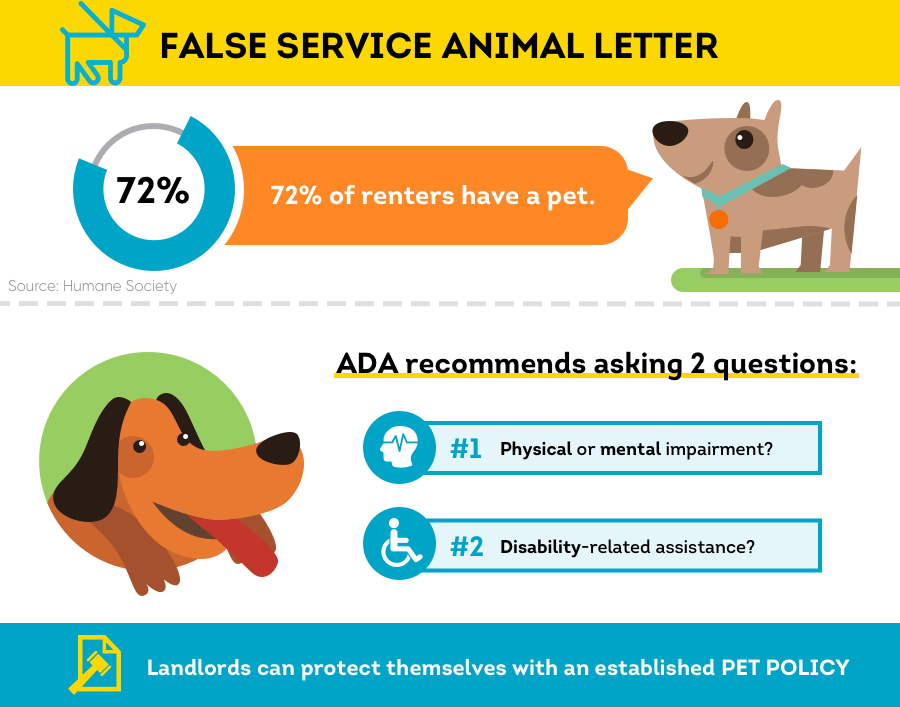
If you do not allow animals on your property, then here’s how to avoid this common rental scam:
- Be sure your pet policy is clearly spelled out in your rental advertisement, and again within the actual lease. This will ensure there’s no confusion if a tenant later claims that they “were unaware” of breaking the rule.
- If the applicant claims that their pet is a service animal, then the ADA recommends asking two questions:
- Does the person seeking to use and live with the animal have a disability—specifically, a physical or mental impairment that substantially limits one or more major life activities?
- Does the person making the request have a disability-related need for an assistance animal? In other words, does the animal work, provide assistance, perform tasks or services for the benefit of a person with a disability, or provide emotional support that alleviates one or more identified symptoms or effects of a person's existing disability?
If the answer to either of these two questions is “yes,” the applicant may be within their legal right to live with their companion service animal. However, it’s still wise to ask for an Emotional Support Animal Letter from a licensed doctor or psychologist (and to include this requirement within your pet policy). Note that there is a difference between a service animal and an Emotional Support Animal (ESA).
As a quick reminder, always check the laws applicable to you and consult legal counsel for legal advice on your responsibilities and obligations under applicable laws.
2. Unauthorized Tenants
Landlords must be extremely careful about who is listed as an occupant on the lease; that individual is responsible for rent payment, any property damage, and fulfilling their rental agreement terms.
Unfortunately, tenants have been known to lie about who they intend to have live with them in the property. In some cases, they may omit a planned roommate from the lease due to a poor credit score or prior eviction that may have disqualified them from the property.
Other times, a tenant may sublease rooms without your permission, either as a short-term vacation rental or long-term monthly agreement, profiting off of what should be your rental income. Whatever the circumstances may be, a person who lives on your property without your permission opens the door to potential legal disputes and future litigation—which is both expensive and time-consuming, as unauthorized occupants can be a very difficult eviction to deal with.
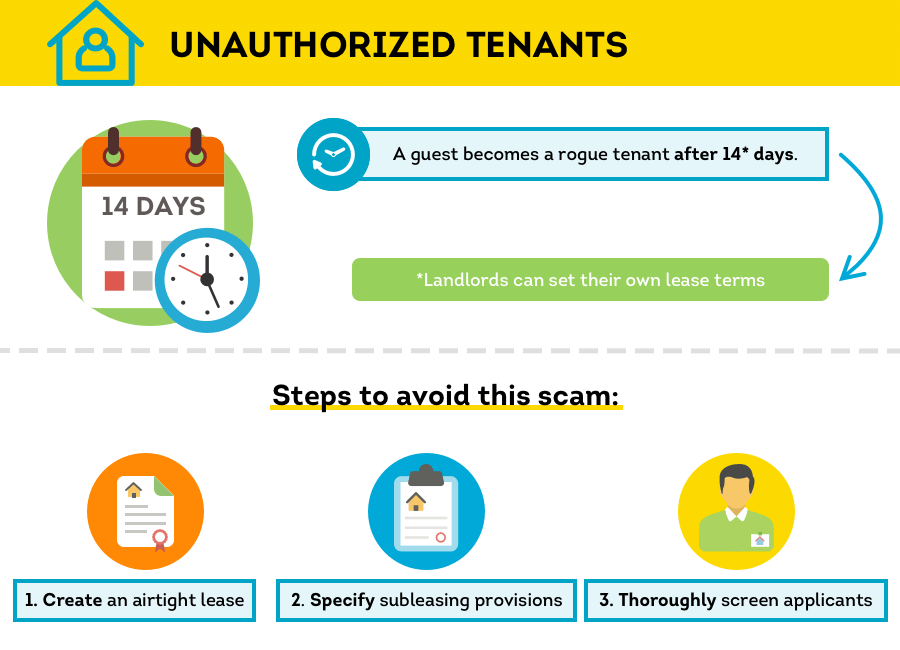
Take the following steps to help protect yourself from this common rental scam:
- Create an airtight lease with clauses about who can live in the property. It should state that each adult's name must be included on the lease and that every occupant age 18+ will be thoroughly screened prior to tenancy.
- Consider adding a lease section about subleasing and state that a breach of provision may be grounds for terminating the lease agreement. When creating your subleasing policies, consider the following:
- Should you allow subleasing at all? Allow with approval on case-by-case basis?
- Will you screen sub-leasers or trust your tenants?
- What are the initial tenant’s responsibilities and liabilities?
- Will you establish visitor policies?
- How long are visitors allowed to stay?
- At what point does the tenant need to ask you about visitor occupancy?
- Thoroughly screen your applicants and review their rental histories. Ask for the names of previous landlords and contact them. A renter’s past behavior is a good predictor of future behavior; the more you know about an applicant’s rental history, the better decision you can make.
3. Fake Credit & Background Reports
According to a SmartMove survey, 84% of landlords say payment problems are their top concern. Running detailed credit reports help reduce the risk of missed rent payments because they provide insight into an applicant’s prior evictions, debt history, and any significant credit mistakes. These can help you predict whether or not an applicant will pay rent on time each month.
In some cases, a tenant may offer to provide their own copy of a credit report. This could be a red flag or it could be totally innocent. After all, too many “hard” checks on someone’s credit can negatively impact a borrower’s credit score. If your applicant is applying for multiple apartments, they might want to avoid having these types of checks on their credit.
However, just because an applicant has a reasonable explanation doesn’t mean you should automatically trust them. Their motivation could be simply to protect their credit worthiness, but it could also be something they want to conceal—and ultimately damage your property.
Thankfully, an easy solution exists. You can ask your tenant to initiate a “soft” credit check with a service like SmartMove credit reports for landlords. This “soft hit” generally bears no impact on the applicants’ credit score. And no “hard” hit means less reason for your applicant protest.
Some landlords pass the cost of a tenant screening service onto the applicant, while others cover it themselves. If you pay for screening yourself, don’t be tempted into accepting an applicant’s credit report on their word alone. It might seem like you’re saving time and money, but a fake report could devastate your business through costly repairs, vacancy, and eviction costs.
Get peace of mind with a verified view of an applicant’s past financial history and current circumstances.
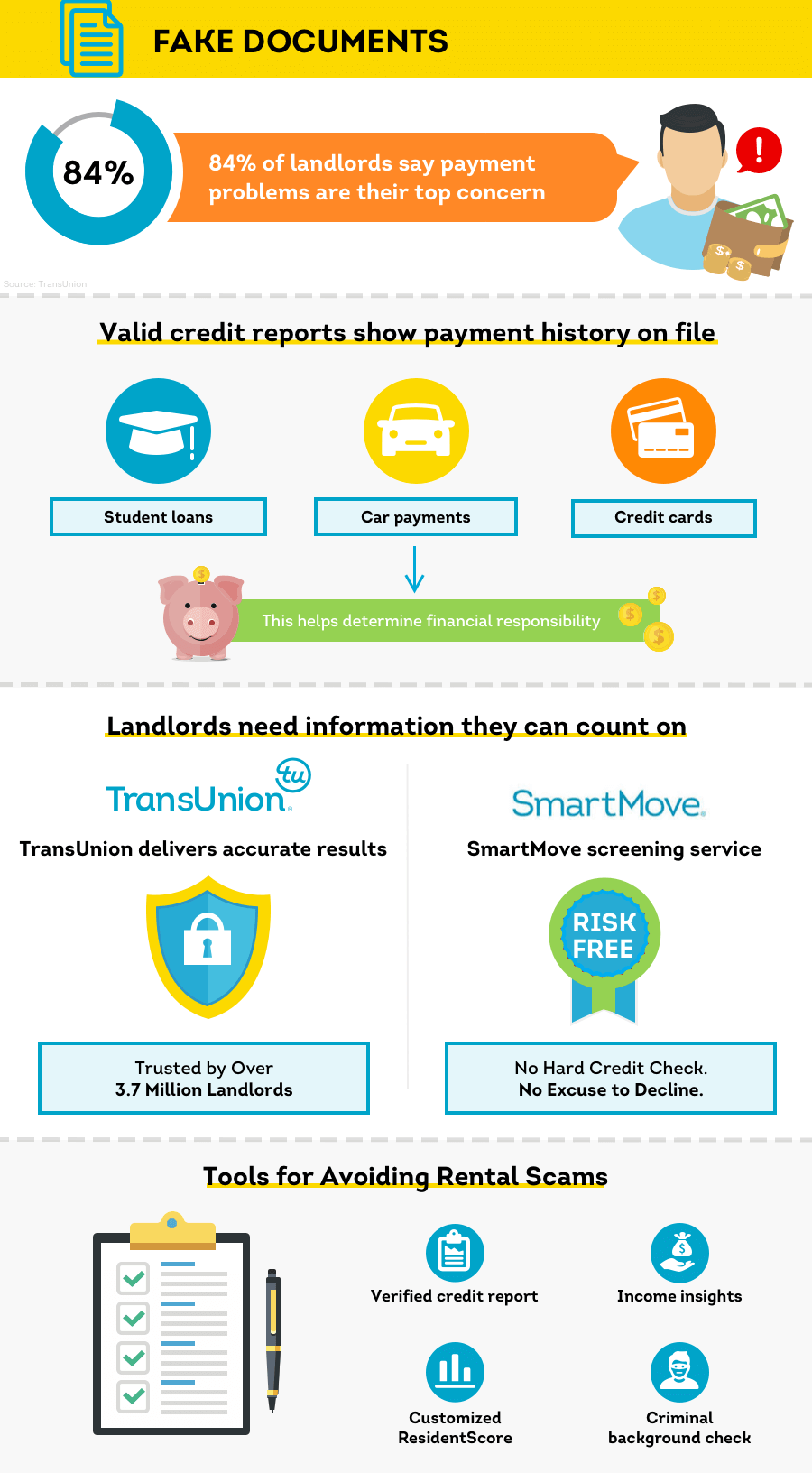
Tips on how to avoid rental scams due to fake credit and background checks:
Don’t trust an applicant on their word alone. Once you have your top candidate(s), use a verified screening service, like TransUnion SmartMove, to guarantee the information your applicant provided is accurate. Make sure the screening agency is reputable and legitimate. It should provide comprehensive tenant background checks that include:
Credit Report
Knowing how to check tenant credit is a crucial part of detecting fraud. Make sure whatever screening service you use is well-established, trustworthy, and complies with all FCRA regulations.
Financial and Income Verification
Proof of income is a critical part of every rental application. However, you should verify an applicant’s self-reported income to make sure they’re providing accurate information. In addition to contacting employers and asking for documentation, you can use tools like Income Insights from SmartMove, to find information on an applicant’s payments and financial standing.
Previous Rental History and Eviction Check
You want to understand the risks of picking a renter. Knowing how a renter has behaved in past rental situations can help predict how they will behave in your space. Contact previous landlords and management companies to verify your applicant was a good tenant. Run an eviction check with a reputable company like TransUnion. You can opt for the ResidentScore®, which can be a better predictor of your applicant’s likelihood of paying rent than a credit report alone.
Criminal Background Check
Your applicant’s financial history might look fine, but are they really who they say they are? To protect your property, investment, and neighbors, it’s smart to conduct a criminal background check in addition to financial checks. If you use a service like SmartMove for a tenant background checks you can get near-instant reports at the same time you’re running credit and ID verification.
The bottom line: Smart landlords don’t just take applicants at their word. In addition to an air-tight lease and detailed rental application, make sure to thoroughly vet your potential tenants with reputable screening and reporting agencies—it’s your best bet for spotting and avoiding scammers.
4. Tenants Who Falsify Proof of Employment
Selecting a tenant with a reliable source of income is crucial. Of course, landlords understand the need for proof of employment when accepting rental applications. However, scammers know this as well; in order to boost their odds of approval, may submit false information on their application. They might even go as far as providing fake pay stubs or W-2s.
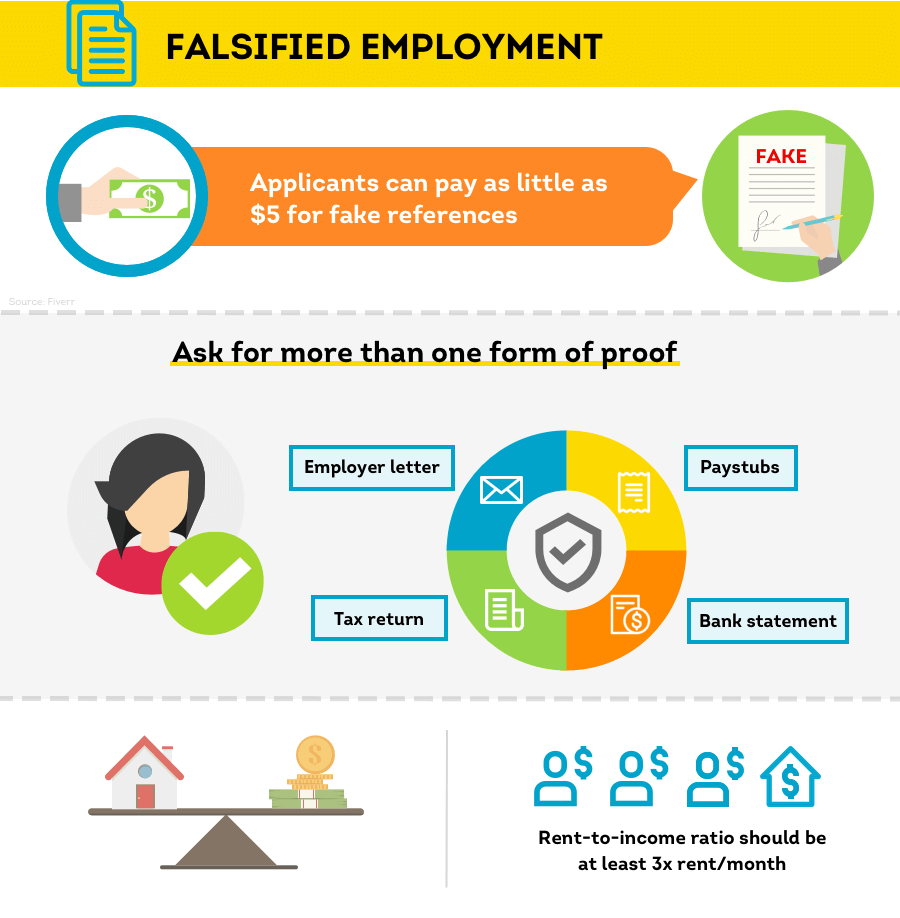
Avoid this rental scam and ensure your tenant has a stable source of income by following these steps:
- Request proof of employment, such as a pay stub or offer letter. If you have doubts, ask for further proof.
- Run a background check that searches employment history, then cross-check your results with the information provided on the rental application.
- Verify their employment by calling their listed employer and asking questions that confirm the details provided to you. However, you should bear in mind that this reference could also be false—another common rental scam—and you may yield better results with the help of a professional screening company.
5. Tenants Who Don’t Intend to Pay Rent
While some renters try to scam landlords by avoiding a lease agreement, others may do so by avoiding rent payment altogether. In this rental scam, the tenant never actually intends to pay rent and instead provides payment with false checks. During the application process, they might have claimed their income meets your renter criteria which, for most landlords, is three times the cost of monthly rent.
Maybe they lied about how much they earn, or maybe they actually do have the means to pay rent and selfishly choose not to. Either way, landlords have their own bills to pay and shouldn’t have to deal with bounced checks or chasing down payments.
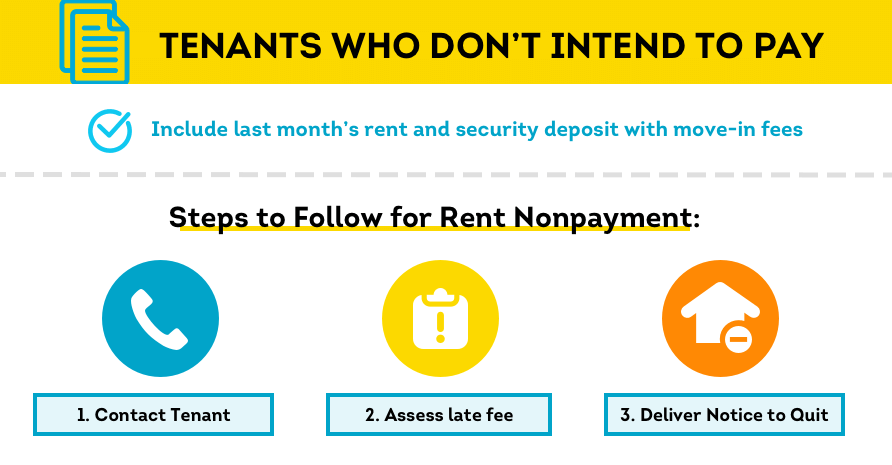
Protect your rental income and avoid being scammed by taking the following measures:
- Cash all checks (such as a security deposit and first month’s rent) before the move-in date to guarantee that your tenant has the appropriate funds in their account and their payment does not bounce.
- Cross-check every piece of information on each top candidate’s rental application. This helps to guarantee the applicant can actually afford to live in the property and will give you peace of mind confirming that there’s nothing in their history that would suggest otherwise.
- Learn how to verify tenant income, perform a credit check, and run a background report. These are critical for protecting your rental property and avoiding rental scams that could leave you stuck with hefty bills. With reliable information about their financial circumstances, it’ll be much easier for you to spot a con artist who has no intention of paying rent.
Avoid Rental Scams by Thorough Tenant Screening
No matter how you prepare, there will always be scammers looking for easy targets. You can help protect yourself against becoming a victim by thoroughly vetting your tenants. Through checking personal references and using professional, online screening services, you can get to know exactly who wants to move in to your space and how they’ve acted in the past.
Double check your applicant’s self-reported financial history with a SmartMove credit check and Income Insight report. These convenient, accurate reports are generated in minutes by TransUnion, one of three national credit reporting agencies. It’s why SmartMove is trusted by millions of landlords each year.
A ResidentScore, criminal background check and eviction history from SmartMove put you in a strong position to discover red flags before a suspicious tenant moves in. You might find out your applicant was evicted for not paying the rent or even that they have a criminal history of fraud.
You can never have complete control over how renters will behave in your property, but you can protect yourself against the most common types of rental fraud. Don’t get tricked into a scam; use TransUnion SmartMove to get the truth about your applicant. After all, not even the Big, Bad Wolf can fool a thorough screening with SmartMove—even if he’s dressed in grandma’s old robe.
Try SmartMove today and learn more about how it can help you protect your rental investment—whether it’s a home, apartment building, or a charming little cabin in the woods.
Know your applicant.
Additional Disclosure:
For complete details of any product mentioned in this article, visit www.transunion.com. This site is governed by the TransUnion Rental Screening Privacy Policy Privacy Notice located at TransUnion Rental Screening Solutions, Inc. Privacy Notice | TransUnion.
